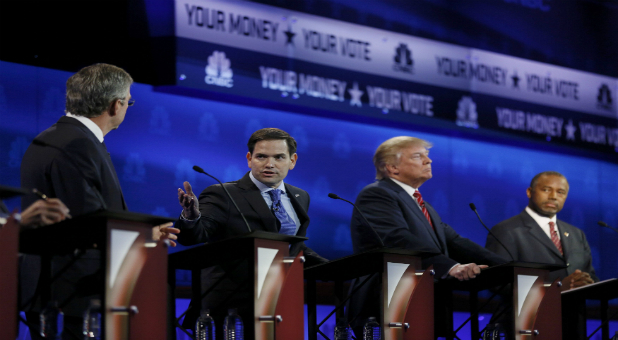Republicans Agree: Moderators, Media Losers In Latest Debate
Republicans agreed on one thing after Wednesday night’s presidential primary debate: The three CNBC anchors moderating the Boulder, Colorado, event were the real losers.
Nearly every candidate, at some point, took a shot at those posing the questions, or the media at large.
Even Party Chairman Reince Priebus took a swipe at the moderators, along with the cable channel that his party had co-ordinated with to host the debate.
“While I was proud of our candidates and the way they handled tonight’s debate, the performance by the CNBC moderators was extremely disappointing and did a disservice to their network, our candidates, and voters,” Priebus said in a statement.
“Our diverse field of talented and exceptionally qualified candidates did their best to share ideas for how to reinvigorate the economy and put Americans back to work despite deeply unfortunate questioning from CNBC.”
This wasn’t the first – or likely last – time the moderators at a Republican primary debate have faced staunch criticism from the candidates or the party. After the 2012 election, Priebus argued the party needed to take more control of the debate process to prevent questions that weren’t in line with the Republican message.
“I have to choose moderators who are actually interested in the Republican Party,” Preibus said in an interview on MSNBC in 2013. But it seems despite imposing strict restrictions on debates this go-round, Priebus remains unhappy.
The debate was moderated by three from CNBC: Becky Quick, John Harwood, and Carl Quintanilla, who bore much of the brunt of the candidates’ scorn for the media
When one question asked former Arkansas Gov. Mike Huckabee whether Donald Trump has the “moral authority” to be president, the crowd booed loudly. Huckabee instead complimented saying Trump is more qualified than Hillary Clinton.
“Such a nasty question, but thank you governor,” Trump responded.
Texas Sen. Ted Cruz was the first to squarely go after the moderators, taking a question about the budget and instead criticizing the moderators.
The questions that have been asked so far in this debate illustrate why the American people don’t trust the media,” he said. He listed five paraphrased examples including, “Donald Trump, are you a comic book villain?” and “Ben Carson, can you do math?”
“This is not a cage match,” he said. “How about talking about the substantive issues?”
He blamed the moderators, saying they were not Republicans and not interested in discussing conservative issues.
“No one watching at home believes that any of the moderators has any intent of voting in a Republican primary,” Cruz said.
The moderators had little tolerance for candidates trying to interject and respond to someone else’s answer, frequently cutting off anyone who tried to chime in. And that frequently drew the ire of the candidates.
Kentucky Sen. Rand Paul tried to interject and then demanded to know who got to decide when candidates were allowed to respond.
“It’s the moderators discretion,” Quick answered, drawing jeers from the audience.
The ire wasn’t limited to the three journalists sitting on stage or their employer. During the debate, the term “mainstream media” – used in a derisive manner – became so common observers joked it would be the key to a debate night drinking game, leaving anybody inebriated if they consumed alcohol each time it was uttered during the program.
Florida Sen. Marco Rubio complained that after Clinton testified before the House Benghazi Committee, the media praised it as her best week in months but that she was actually “exposed as a liar.”
Asked about his personal finances, Rubio struck back at the press. “It’s actually evidence of the bias that exists in the American media today,” he said.
©2015 Thompson Reuters. All Rights Reserved.

